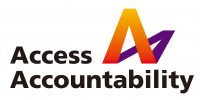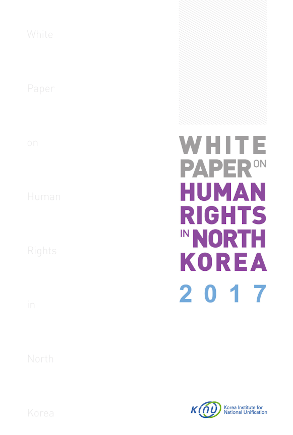To download the publication: http://repo.kinu.or.kr/handle/2015.oak/8480
The White Paper on Human Rights in North Korea 2017 is a comprehensive analysis of the human rights issues in North Korea by the Korea Institute for National Unification (KINU). The majority of the information is based on investigations conducted in 2016 and interviews with defectors (North Koreans who have escaped to South Korea) as well as official documents released by North Korea and the United Nations (UN).
The report highlights the lack of proper civil and political rights in North Korea. The people face high levels of torture and even execution as there is a long list of crimes that can warrant the death penalty. The legislation, especially in matters regarding rights to life, does not adhere to the guidelines of International Covenant on Civil and Political Rights (ICCPR).
Executions are often carried out in public and people are forced to watch them. Violence and torture have been reported at many Ministry of State Security (MSS) detention facilities, not to mention the poor levels of nutrition, sanitation and medical attention. It is especially worse in centers near the border as there is no freedom of movement in North Korea and border control is becoming more strictly controlled. To make matters worse, North Koreans are not given the right to fair trial. There are judicial systems in place such as the Comrade Trial System and the MSS Political Criminal Trial System, but in reality, the system is arbitrary and citizens’ right to appeal or counsel are heavily limited. North Korea has violated many other fundamental civil and political rights such as severe surveillance, social control and infringement of privacy and discrimination based on background (songbun) in residence, employment, and public service.Executions are often carried out in public and people are forced to watch them. Violence and torture have been reported at many Ministry of State Security (MSS) detention facilities, not to mention the poor levels of nutrition, sanitation and medical attention. It is especially worse in centers near the border as there is no freedom of movement in North Korea and border control is becoming more strictly controlled. To make matters worse, North Koreans are not given the right to fair trial. There are judicial systems in place such as the Comrade Trial System and the MSS Political Criminal Trial System, but in reality, the system is arbitrary and citizens’ right to appeal or counsel are heavily limited. North Korea has violated many other fundamental civil and political rights such as severe surveillance, social control and infringement of privacy and discrimination based on background (songbun) in residence, employment, and public service.
The economic, social and cultural rights in North Korea also fall below standards. People still experience shortage of food, largely due to the discrimination of the rationing system. Healthcare is another huge problem as facilities and doctors are inadequate for proper treatment and people find it difficult to access medicine. The right to work is disregarded as well as job assignment is based on background and financial capability, rather than individual skill or choice.
In response to criticism and concern from the international community, North Korea has reportedly committed to three implementation policies to protect vulnerable groups: Convention on the Elimination of all Forms of Discrimination Against Women (CEDAW), Convention on the Rights of the Child (CRC), and Convention on the Rights of Persons with Disabilities (CRPD). However, women still suffer from discrimination, gender inequality, fixed gender roles and the double burden of domestic and social labor. Female defectors are especially targeted as they are often forced to miscarry and treated inhumanely in the process of repatriation. Women in rural areas are also more vulnerable due to lack of maternal health and poor healthcare facilities. In terms of CRC, North Korea fails to protect children’s rights as well, indicated by the low welfare level, especially for those who live outside Pyongyang or in the rural areas. The country’s education policy is a major issue that has yet to be addressed and students are often mobilized to make up for labor shortage. In terms of CRPD, there are rehabilitation facilities available for people with disabilities, but the reality of the training quality remains poor.
Other issues include corruption and bribery in judiciary and bureaucratic institutions (from trial processes to travel permits and job assignments) and exploitation of dispatched North Korean overseas workers. These workers are not guaranteed protection in terms of working conditions, salary, or even their return back to North Korea. Some are subjected to forced labor if the costs of travel have not been paid off by the workers themselves. They are especially vulnerable because their worker ID cards are confiscated by the Safety Officer (usually a North Korean authority).
This is merely an outline of the human rights violations in North Korea. The White Paper on Human Rights in North Korea 2017 goes into further detail and analysis in their comprehensive report, with more specific examples and testimonies. The chapters provide a deeper understanding of the tragic reality people face within the country.
Last Updated: November 29, 2018
Author: Yonkyoo Joo

